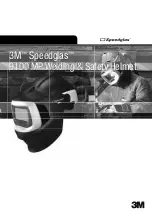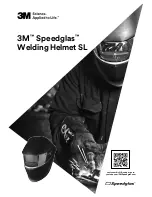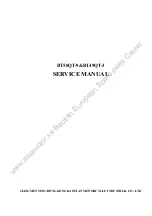
ROYAL ENFIELD WORKSHOP MANUAL
Section L1 Page 4
8. Removal of Ball Bearings
To remove the ball bearings take the
complete wheel out of the machine and separate
the main portion of the wheel from the
sprocket/brake drum cush drive shell assembly
as described above. To remove the bearing from
the fixed section of the hub barrel first remove
the brake cover plate complete with brake shoe
assembly; then remove the felt washer, 9484,
and distance collar, 11203. Now screw the loose
section of the spindle into the fixed section and
drive out the bearing by hitting the hexagon
headed end of the loose section of the spindle.
To remove the bearing from the loose half of
the hub barrel first lift away the distance collar,
39323, speedometer drive gearbox, the spacing
collar, 39321, and the felt washer, 9484. Now
enter the loose section of the spindle into the
distance tube, 39312, from the driving sprocket
end and drive out the distance tube with the two
distance tube washers, 39313, and the bearing by
means of a hammer and drift applied to the
hexagon headed end of the loose section of the
spindle.
9. Hub Bearings
These are deep groove single row journal
ball bearings 5/8 in. i/d by 1.13/16 o/d by 5/8 in.
wide. The Skefko Part Number is RMS5.
Equivalent bearings of other makes are
Hoffmann MS7, Ransome and Marles MJ5/8
in., Fischer MS7.
10.
Fitting Limits for Bearings
The fit
of the bearings in the hub barrel is
important. The bearings are locked on to the
spindle by the various distance pieces. In order to
prevent endways pre-loading of the bearings, it is
essential that, when everything is locked up,
there is a small clearance between the inner edge
of the outer race of the bearing and the back of
the recess in each half of the hub barrel. To
prevent any possibility of sideways movement of
the hub barrel on the bearings it is, therefore,
necessary for the bearings to be a tight fit in the
barrel but this fit must not be so tight as to close
down the outer race of the bearing and thus
overload the balls. The following are the
manufacturing tolerances which control the fit of
the bearings. The figures for the bearings
themselves are for SKF bearings, but other
manufacturers' tolerances are similar.
Bearing o/d
1.8122/1.8117 in.
Housing bore
1.8115/1.8110in.
Bearing bore
.6252/.6247 in.
Shaft diameter
(Loose side)
.624/.622 in.
Shaft diameter
(Fixed side) .6252/-6248 in.
11.
Refitting Ball Bearings
In order to prevent the possibility of
endways pre-loading of the bearings the
following procedure should be followed
carefully when fitting new bearings or refitting
old ones
(a) The bearing in the fixed section of the
hub barrel should be fitted first together
with the fixed section of the spindle using
a special drift, as shown in Fig. 4,
preferably under a press, if necessary
using light hammer blows. This drift
prevents the bearing being pushed right
down to the bottom of its recess.
(b) The bearing in the loose half of the barrel
is pressed in using either the drift part of
E.4823, or a suitable piece of tube 1.3/4
in. diameter with the end ground square
so as to put pressure on the outer race of
the bearing only. This bearing should be
pressed or knocked only about half way
into its recess at the present stage.
(c) The two parts of the wheel are put
together and the three attachment bolts,
39316, are fitted and tightened.
(d) The bearing in the loose half of the barrel
is now driven home by means of the same
drift until further movement is prevented
by the inner face of the inner race coming
against the end of the distance tube,
39312.
As a check that the bearings are fitted
correctly the loose section of the spindle and the
spindle nut, 36651, can be fitted with suitable
distance pieces beneath them so that, when the
spindle and spindle nut are tightened, pressure is
put on to the inner races of the bearings. When
tightened solid the spindle should still be quite
free to turn with the fingers. If the spindle is free
before the nuts are tightened but not free
afterwards, it is evident that there is end load on
the bearings due to the bearing in the loose half
of the hub not having been fitted deep enough in
its recess. In this case the outer race should be
tapped home with a tubular drift.
www.hitchcocksmotorcycles.com
Summary of Contents for 500 TWIN 1949
Page 7: ...ROYAL ENFIELD WORKSHOP MANUAL w w w h i t c h c o c k s m o t o r c y c l e s c o m ...
Page 51: ...ROYAL ENFIELD WORKSHOP MANUAL w w w h i t c h c o c k s m o t o r c y c l e s c o m ...
Page 63: ...ROYAL ENFIELD WORKSHOP MANUAL w w w h i t c h c o c k s m o t o r c y c l e s c o m ...
Page 69: ...ROYAL ENFIELD WORKSHOP MANUAL w w w h i t c h c o c k s m o t o r c y c l e s c o m ...
Page 81: ...ROYAL ENFIELD WORKSHOP MANUAL w w w h i t c h c o c k s m o t o r c y c l e s c o m ...
Page 91: ...ROYAL ENFIELD WORKSHOP MANUAL w w w h i t c h c o c k s m o t o r c y c l e s c o m ...
Page 108: ...ROYAL ENFIELD WORKSHOP MANUAL NOTES w w w h i t c h c o c k s m o t o r c y c l e s c o m ...
Page 109: ...ROYAL ENFIELD WORKSHOP MANUAL NOTES w w w h i t c h c o c k s m o t o r c y c l e s c o m ...
















































